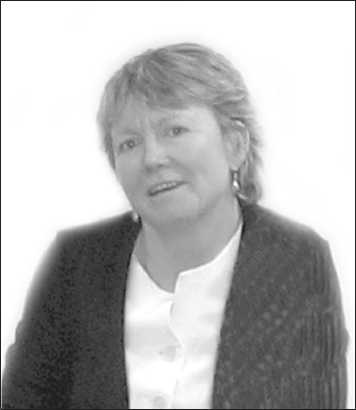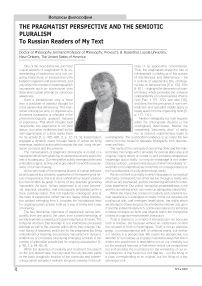The pragmatist perspective and the semiotic pluralism to russian readers of my text
Автор: Rosenthal S.B.
Журнал: Физическая культура, спорт - наука и практика @fizicheskaya-kultura-sport
Рубрика: Вопросы философии
Статья в выпуске: 3, 2008 года.
Бесплатный доступ
Короткий адрес: https://sciup.org/14265992
IDR: 14265992
Текст статьи The pragmatist perspective and the semiotic pluralism to russian readers of my text
Doctor of Philosophy, Eminent Professor of Philosophy, Provost S. B. Rosenthal, Loyola University, New Orleans, The United States of America
One of the most distinctive and most crucial aspects of pragmatism is its understanding of experience as a rich ongoing interactional or transactional unity between organism and environment, and only within the context of meanings which incorporate such an interactional unity does what is given emerge for conscious awareness.
Such a transactional unity is more than a postulate of abstract thought for it has experiential dimensions. The interactive ontological unity of organism-environment transaction is reflected in the phenomenologically grasped features of experience. That which intrudes itself inexplicably into experience is not bare datum, but rather evidences itself as the over-againstness of a thick reality there

for my activity [1, p. 425–426; 2, p. 12–13; 3]. Interpretation engages a dynamic reality through habits of action as living meanings, habits of action which provide the vital, living link between concepts and the universe.
The contextualism of pragmatic philosophy is rooted in a naturalism which both gives rise to interpretive activity and is the test of its adequacy. Our interpretive activity emerges within and embodies organic activity and is grounded in a world not exclusively of our own making.
At the very heart of the temporal stretch of human behavior as anticipatory is a creativity, expressive of the experimental nature of experience, that is at once unified with a natural universe but that renders its grasp in terms of any absolute grounding impossible. As such, human awareness is at once theoretical, practical, pluralistic, and ontologically embedded within a thick, resisting nature. This rich epistemic-ontological unity at the heart of experience, rather than any falsely reified interpretive content emerging from it, provides the foundational level for ongoing human activity, both as a way of being and a way of knowing.
The two directional openness of experience carries temporality from one pole to the other, from a phenomenology of worldly experience toward a process metaphysics of nature. The temporal structure that belongs to our interpretive processes belongs as well to the universe within which they emerge. Human habits of response, which are for the pragmatist the living embodiment of meaning, are precisely “naturally thick” dynamic tendencies or processes structuring emerging activities in the context of alternative possibilities for ongoing actualization [1, p. 58; 2, p. 64–65; 4].
Within the dynamics of creativity and constraint, the search for the fully determinate, the fully fixed, the fully discrete yields to the basic pragmatic intuition of the continuity and indeterminacy which pervade a radically temporal universe in the full- ness of its space-time concreteness. Thus, the pragmatists stress the role of infinitesimals in ridding us of the notions of discreteness and determinacy – be it notions of experiential bits, ontological bits, or temporal bits [5, p. 153–154; 6–8] 1,– highlight the dimension of indeterminacy which pervades the universe independently of consciousness (Peirce Coll. Pap. 1.171–172), see also [10], and deny that the principles of non-contradiction and excluded middle apply to reality apart from the organizing mind [5, p. 117; 11] 2.
Neither intelligibility nor truth requires either the ontologically discrete or the ontologically determinate. Neither the ceaselessly “becoming other” of reality nor its inherent indeterminacy leads to unintelligibility. The postmodern tendency to so relate the two stems from the refusal to separate intelligibility from discreteness and fixity.
The reality of the continuity of becoming other and the indeterminacy this brings with it provides for rational discourse and ongoing inquiry which is rooted in and provides perspectival knowledge about reality, so long as knowledge is not understood as a direct, uninterpreted seizure of what immediately “is”, and truth is not understood as conformity or correspondence to the fixed discretes of a fully determinate reality.
We do not think to a reality to which language or conceptual structures correspond, but rather we live through a reality with which we are intertwined, and the intertwining with which constitutes experience. Our primal interactive embeddedness in the world is something which can never be adequately objectified.
Within the interactive context of creativity and constraint human experience is analogous to reality in that our activities are continuous with, and emergent levels within, the reality which we attempt to characterize by the interpretive nets we cast upon it; and the indeterminately rich, continuous nature of a temporal universe emerges as facts and objects within the interpretive context of organism-environment interaction.
Truth is relative to a context of interpretation not because truth is relative, but because without an interpretive context the concept of truth is meaningless. Truth is not an absolute grasp, a correspondence with an external reality, but neither is it relative. It is perspectival. We create the perspective, but whether or not it allows us to grasp in workable ways that which enters into experience is dependent not on our creativity but on the resistant features of that which enters our perspectival net and provides the touchstone for the workability of our interpretations. A true belief is a tool that fits – not the fitting of a copy corresponding to an original, but the fitting of a key opening a lock.
Reality answers our questions and determines the workability of our meanings, but what questions it answers are partially dependent on what questions we ask and what meanings work depend upon the meanings we bring.
The indefinitely rich concreteness of a process universe is revealable in various ways through various meaning structures. Our perceptual environment, which grounds the emergence of facts and objects and provides the foundation for other, more abstract or more imaginative environments, is existentially one with the spatio-temporal unfolding of an indeterminate reality. It is, metaphysically, that independently real.
Yet, our various environments are dependent upon the meaning systems or interpretive contexts which grasp in a way in which the full concreteness of spatio-temporal reality is not, for they are perspectives of the indefinitely rich reality which has been “fixed” or “carved out” by systems of meanings.
The concrete processes of nature are a dimension of our everyday natural environment. Nature as a system of scientific objects or events is a reflective, creative, abstract explanatory net which arises out of our meaningful everyday world and is cast upon an indefinitely rich universe, one which works well for the purposes of scientific explanation.
If this explanatory net is substituted for the temporally grounded features of an indefinitely rich universe, or becomes in any way the absolute model for understanding it, then the problems and dilemmas that have haunted the philosophical tradition will remain impassable.
…Throughout many levels, truth is both made and found. The so-called tensions between truth as made and truth as found, between truth as changing and truth as fixed, result from focusing on diverse dimensions operative within the intertwining of human interpretive activity and the temporal unfolding of a processive universe. We create the interpretive frameworks within which beliefs can emerge and be found true or false and within which investigation can tend toward agreement.
The creative intelligence involved in radical changes and shifts of interpretive frameworks is influenced by socio-cultural conditions, but is ultimately founded not in a relativistic, per-spectivally closed historicism, but in an ontologically grounded, perspectivally open temporalism. The criterion for adequately cutting into the indefinitely rich array of possibilities of experience offered by the dynamics of an indeterminately rich concrete universe is workability, but workability can be established only relative to some meaningful network by which experience is “caught”.
Valid knowledge claims are fallibilistic, perspectival, and temporal, but nonetheless grounded in a thick reality. This position denies the arbitrariness of antifoundationalism, antirealism, relativism, a historicism of present happenstance, as well as the absoluteness of foundationalism, realism, objectivism, the absolute grasp. And, it this way it avoids the extremes of either relativistic irresponsibility or dogmatic commitment or imposition, replacing both with the importance of ongoing inter-perspec-tival dialogue which allow for the advancement of knowledge and the ongoing enrichment of human existence.
It calls for commitment to one’s perspective as it proves to advance these goals, but yet openness to other perspectives which may, in their own way, be accomplishing the same goals.
Instead of the conclusion
Pragmatism attempts to draw one toward an awareness of the interactive openness, at the heart of experience, of humans and the natural universe in which they are embedded, and in so doing provide the path for freeing thinking from premature ontological assertions, from illicit reifications, and from a tradition of philosophy which, in its search for supposed foundations, lost the illusive but pervasive existential foundations of its search.
And if, as pragmatism holds, the pulse of human existence at its very core is, both existentially and epistemically, creatively intertwined with, and thus attuned to, an indeterminately rich processive universe which reveals itself in various ways both within and among various levels and modes of human activity, then attunement to this sense of human existence can yield at once both a more demanding and more tolerant master than any of the diverse second level articulations to which it gives rise.
Notes
-
1 Cited using conventional two-part notation 6.109, 6.111, 6.87, 5.282, 6.138. For an integration of these and the immediately following references in terms of the above issue, see my work [9].
-
2 It is par. 5.448. For the way continuity pervades all of reality, see my work [12].
ПРАГМАТИСТСКИЙ ВЗГЛЯД И СЕМИОТИЧЕСКИЙ ПЛЮРАЛИЗМ
Российским читателям моего текста
Университет Лойолы, Новый Орлеан, Соединенные Штаты Америки
Данная статья написана одним из наиболее интересных «работающих» философов сегодняшних Соединенных Штатов и продолжает развитие некоторых идей, высказанных ранее в монографиях автора, посвященных прагматическому плюрализму Чарльза Пирса (1994) и современным взглядам на время, непрерывность и неопределенность (2000). В предлагаемой статье рассматриваются контекс-туализм прагматической философии, а также семиотическая проблема интерпретации, значения и актуализации. Неопределенно «богатая» конкретность Вселенной «открывается» нам через различные структуры значения. Научное объяснение является абстрактной «сетью», которая возникает из нашего повседневного мира и «бросается» на неопределенно «богатую» Вселенную. Критерий для определения адекватности «врезания» внутрь неопределенно «богатого» множества возможностей опыта, предлагаемого динамикой Вселенной,– «работоспособность», но эта «работоспособность» может быть установлена только относительно некоторой значащей «сети», которой «пойман» опыт. Статья адресована ученым-философам, аспирантам и университетским преподавателям, а также всем, кто глубоко интересуются вопросами современной философии и семиотики.


